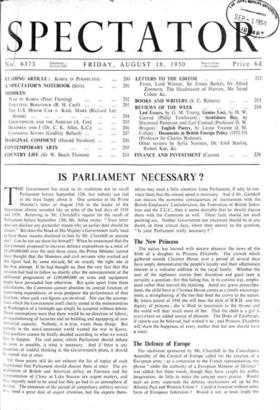IS PARLIAMENT NECESSARY ?
THE Government has stuck to its resolution not to recall Parliament before September 12th, but nobody can feel in the least happy about it. One sentence in the Prime Minister's letter of August 13th to the leader of the Opposition almost sounded like an echo of the bad days of 1938 - and 1939. Referring to Mr. Churchill's request for the recall of Parliament before September 12th, Mr. Attlee wrote: " Your letter does not disclose any particular reason why an earlier date should be chosen." But does the Head of His Majesty's Government really need to have those reasons disclosed to him by Mr. Churchill or anyone else? Can he not see them for himself? When he announced that the Government proposed to increase defence expenditure to a total of £3,400,000,000 over the next three years, the Prime Minister cannot have thought that the Ministers and civil servants who worked out this figure had, by some miracle, hit on exactly the right one at the first attempt. If he had thought so, then the very fact that this revision had had to follow so shortly after the announcement of the additional programme of £100,000,000 on arms and equipment might have persuaded him otherwise. But quite apart from these calculations, the Commons cannot abandon its central function of supervising expenditure, or even postpone the performance of that function, when such vast figures are involved. Nor can the assump- tions which the Government itself clearly stated in the memorandum to Washington of a fortnight ago simply be accepted without debate. Those assumptions were that there would be no direction of labour, no requisitioning of factories and no building and equipping of new industrial capacity. Nobody, it is true, wants these things. But nobody in the non-Communist world wanted the war in Korea. The question cannot be finally decided according to what we would like to happen. The real point, which Parliament should debate as soon as possible, is what is necessary. And if there is any suspicion of wishful thinking in the Government's plans, it should be rooted out at once.
Yet these points still do not exhaust the list of topics of such importance that Parliament should discuss them at once. The co- ordination of British and American policy on Formosa and the representation of China at Lake Success are urgent matters, and they urgently need to be aired lest they go bad in an atmosphere of secrecy. The extension of the period of compulsory military service may need a great deal of expert attention, but the experts them- selves may need a little attention from Parliament, if only to con vince them that the utmost speed is necessary. And if Mr. Gaitskell can discuss the economic consequences of rearmament with the British Employers' Confederation, the Federation of British Indus- tries and the T.U.C., then it seems desirable that he should discuss them with the Commons as well. These facts should not need pointing out. Neither Government nor electorate should be in any doubt, in these critical days, about their answer to the question, " Is your Parliament really necessary ? "


































